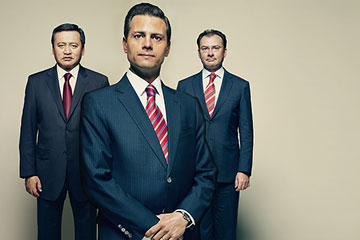
Left to right: Miguel Ángel Osorio Chong, Interior Minister; Enrique Peña Nieto, President; Luis Videgaray Caso, Finance Minister
(4 of 5)
Credit Peña Nieto with good timing too. Rising labor costs in China have made Mexican wages cheaper by comparison, reversing a dynamic that held for most of the 2000s. Meanwhile, a slowdown has dampened foreign enthusiasm for Brazil's economy, making Mexico look more appealing. Even Peña Nieto's critics don't deny that he has delivered changes that could transform Mexico's economy. "The question," says Manuel Camacho Solís, a member of the Mexican Senate, "is whether that will create the outcome they want."
Camacho is suspicious that Peña Nieto's agenda seems to be a bigger hit in Davos than in Xico. "Investors applaud. Newspapers outside the country applaud. So why does the image of the President keep falling?" asks Camacho, noting that Peña Nieto's poll numbers have fallen several points below 50%. (Some trace the poll slump to a recent pause in economic growth that economists call temporary.)
In a country rife with corruption, rapid growth is more likely to produce oligarchy than broad prosperity, Camacho warns. He says Peña Nieto must act on his pledges to combat corruption, though he doubts that will happen: "If we don't have the political will, then the outcome will not be Norway. It will be Yeltsin's Russia."
A Path to Modernity?
Even Yeltsin's Russia didn't have the sort of sociopathic gangsters who plague Mexico today--and who threaten to stunt its potential. Drug smuggling boomed in the country in the late 1990s after a U.S.-led crackdown largely choked off Caribbean smuggling routes and forced traffickers to find new ones through Central America. Extreme violence followed as cartels vied for business and turf. In 2009, Mexican police captured a drug-world figure who could have been devised by the creators of Breaking Bad: dubbed the Stewmaker, he allegedly disposed of some 300 dead bodies by dissolving them in acid. The symbolic nadir may have come the night in 2006 when patrons at a Michoacán nightclub looked down to see five severed heads rolling across the dance floor.
Later that year, Peña Nieto's predecessor, Felipe Calderón, launched a massive crackdown on the cartels and a campaign to end drug trafficking. Bush and Obama backed up 50,000 Mexican army troops with over a billion dollars in funding, military equipment and surveillance drones. But apart from headlines touting the arrests of various kingpins, the effort produced little but more violence. Since the start of the Calderón offensive, the drug war has claimed more than 60,000 Mexican lives.
Peña Nieto promised to tackle the violence. But once in power he seemed to de-emphasize the drug war. U.S. officials worry that drug lords understand that the pressure will ease on their trafficking so long as the heads--so to speak--stop rolling. "The government's messaging outside the country is about changing the conversation from the cartels to Mexico's economic potential," says Wood.
